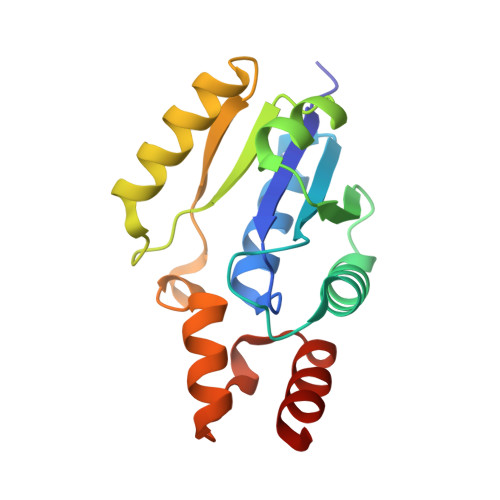Fragment-Based Drug Discovery of Inhibitors of Phosphopantetheine Adenylyltransferase from Gram-Negative Bacteria.
Moreau, R.J., Skepper, C.K., Appleton, B.A., Blechschmidt, A., Balibar, C.J., Benton, B.M., Drumm, J.E., Feng, B.Y., Geng, M., Li, C., Lindvall, M.K., Lingel, A., Lu, Y., Mamo, M., Mergo, W., Polyakov, V., Smith, T.M., Takeoka, K., Uehara, K., Wang, L., Wei, J.R., Weiss, A.H., Xie, L., Xu, W., Zhang, Q., de Vicente, J.(2018) J Med Chem 61: 3309-3324
- PubMed: 29498517
- DOI: https://doi.org/10.1021/acs.jmedchem.7b01691
- Primary Citation of Related Structures:
6CCK, 6CCL, 6CCM, 6CCN, 6CCO, 6CCQ, 6CCS - PubMed Abstract:
The discovery and development of new antibiotics capable of curing infections due to multidrug-resistant and pandrug-resistant Gram-negative bacteria are a major challenge with fundamental importance to our global healthcare system. Part of our broad program at Novartis to address this urgent, unmet need includes the search for new agents that inhibit novel bacterial targets. Here we report the discovery and hit-to-lead optimization of new inhibitors of phosphopantetheine adenylyltransferase (PPAT) from Gram-negative bacteria. Utilizing a fragment-based screening approach, we discovered a number of unique scaffolds capable of interacting with the pantetheine site of E. coli PPAT and inhibiting enzymatic activity, including triazolopyrimidinone 6. Structure-based optimization resulted in the identification of two lead compounds as selective, small molecule inhibitors of bacterial PPAT: triazolopyrimidinone 53 and azabenzimidazole 54 efficiently inhibited E. coli and P. aeruginosa PPAT and displayed modest cellular potency against the efflux-deficient E. coli Δ tolC mutant strain.
- Novartis Institutes for BioMedical Research , 5300 Chiron Way , Emeryville , California 94608 , United States.
Organizational Affiliation:


















